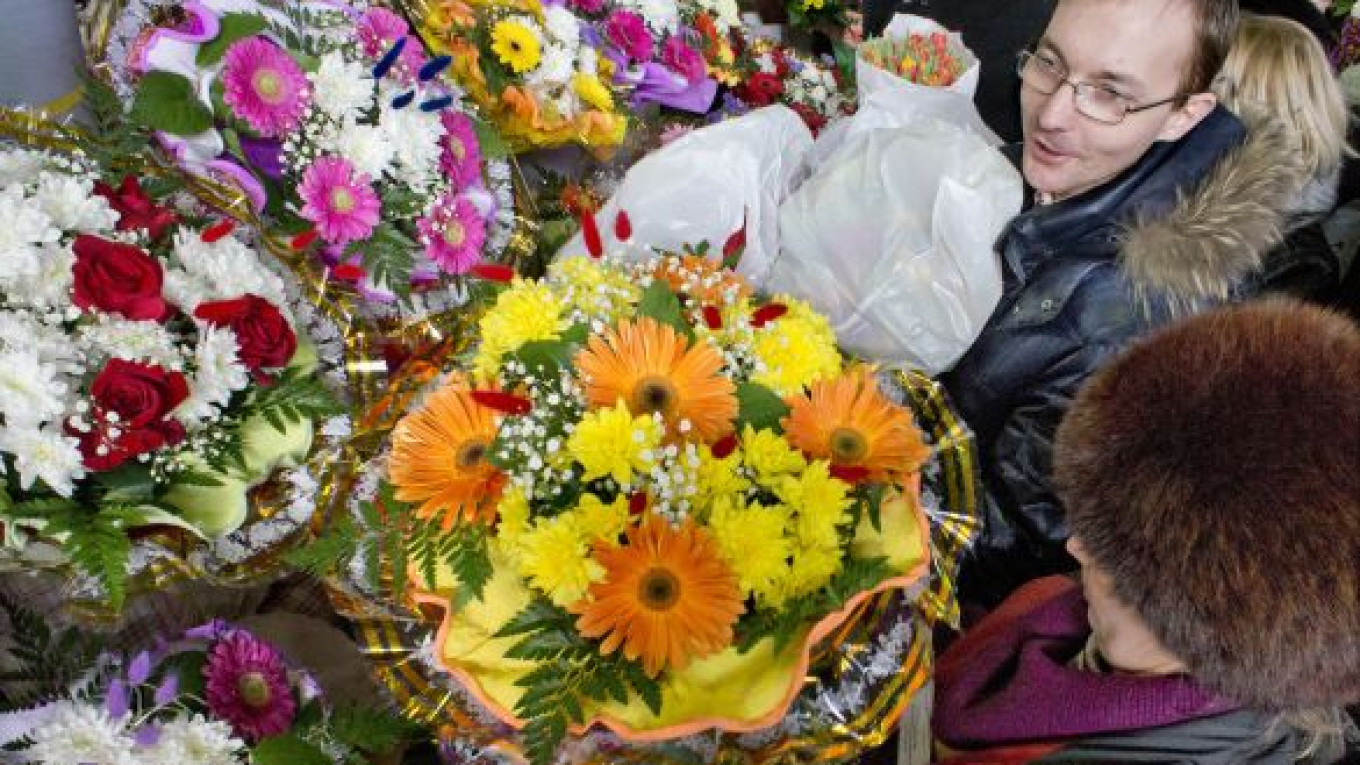A dark and damp basement in Kievsky Station is full of flowers, with buckets of white, red, yellow and pale pink tulips forming a colorful carpet, in sharp contrast to the unfriendly atmosphere.
The place is hard to find, since it’s one of the few sales points that remained around the Kievskaya metro station after a nearby flower market was closed last year as part of Moscow Mayor Sergei Sobyanin’s initiative to get rid of street kiosks and stalls in the city center.
“I should be appointed a mayor. Then there would be flowers all over Moscow, they’d be sold right in front of the White House,” said Arkhan, a salesman, who declined to give his last name.
Arkhan, who brought a Moscow Times reporter to the sales point on Tuesday, said prices for his flowers more than doubled a week before International Women’s Day, as a dramatic increase in demand becomes a traditional bonanza for the country’s fresh-flower industry.
The price for Dutch tulips, which normally cost about 30 rubles ($1) a flower, now ranges from 50 rubles to 70 rubles, Arkhan said.
Flowers remain the most popular gift for International Women’s Day, which is celebrated in Russia and some former Soviet states on March 8.
A total of 54 percent of men plan to give flowers as a gift this year, while 45 percent of women hope to get them on their holiday, Interfax reported Tuesday, citing pollster Levada Center.
A saleswoman in a kiosk near the Marina Roshcha metro station who introduced herself as Yulia said salesmen have to increase prices along with suppliers located predominantly in the Netherlands and Ecuador.
Yulia said prices for her flowers had grown more than 50 percent a week ahead of the holiday.
“The Dutch and Ecuadorians know that we have a flower boom once a year,” she said smiling.
With about 70 percent of Russia’s import of fresh flowers, Ecuador and the Netherlands are the country’s major suppliers, according to market research company Global Reach Consulting.
Other big suppliers are Colombia and Kenya. About 85 percent of flowers in Russia are imported, with the remainder grown in local greenhouses.
Moscow accounts for 40 percent of the country’s market for fresh flowers, most of which are sold in markets and kiosks, according to Intesco Research Group.
A total of 20 percent to 35 percent of flowers are sold in flower shops.
A sales assistant in one of them — an outlet of French chain Au nom de la rose, which focuses on roses — in a shopping center just across from Kievsky Station said prices for their flowers are fixed and don’t increase before the holiday.
Prices for flowers imported from Eсuador and Kenya range from 79 rubles to 119 rubles a piece and are set by the company’s French headquarters, the shop assistant said.
The overall volume of fresh-flower retail sales declined 5 percent in 2011 to $2.4 billion, as the industry was just recovering after the crisis in the first half of the year, when most of the annual sales occur, Intesco Research Group said in e-mailed comments.
The company expects sales to increase 5 percent to 10 percent this year, with growing import volumes being the major driver. Salespeople in kiosks promised that prices would return to the pre-holiday level after current shipments are fully sold out.
But regardless of how high prices are, Yulia from the kiosk near Marina Roshcha is sure that she’ll have at least one permanent customer — a man who she said buys his girlfriend 25 roses on the 20th of every month to mark the anniversary of their acquaintance.
A Message from The Moscow Times:
Dear readers,
We are facing unprecedented challenges. Russia's Prosecutor General's Office has designated The Moscow Times as an "undesirable" organization, criminalizing our work and putting our staff at risk of prosecution. This follows our earlier unjust labeling as a "foreign agent."
These actions are direct attempts to silence independent journalism in Russia. The authorities claim our work "discredits the decisions of the Russian leadership." We see things differently: we strive to provide accurate, unbiased reporting on Russia.
We, the journalists of The Moscow Times, refuse to be silenced. But to continue our work, we need your help.
Your support, no matter how small, makes a world of difference. If you can, please support us monthly starting from just $2. It's quick to set up, and every contribution makes a significant impact.
By supporting The Moscow Times, you're defending open, independent journalism in the face of repression. Thank you for standing with us.
Remind me later.






